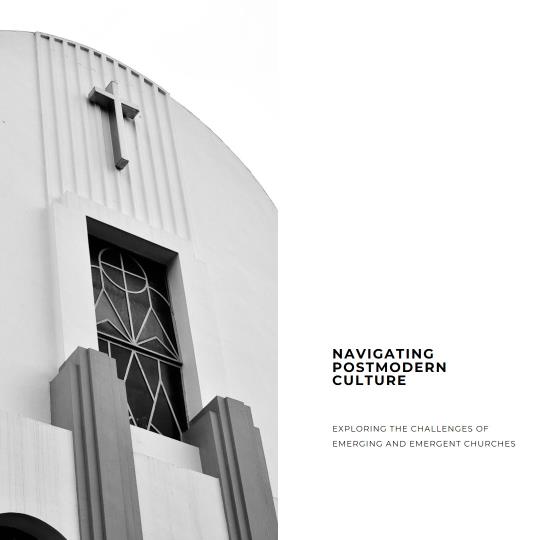Written by Lesallan – November 21, 2023

Emerging vs. Emergent Church
Over the past few decades, two movements have emerged among some Christians seeking to engage with postmodern culture and its challenges: the emerging and emergent churches. Despite some similarities, they have different theological orientations and practices. As Driscoll (2006) notes, the emerging church is “a growing, loosely connected movement of young pastors who are happy to see modernity fade and are working as missionaries to bring the gospel of Jesus Christ to emerging and postmodern cultures” (p. 88). On the other hand, the emergent church is a “smaller, more narrowly defined network of individuals and churches that are mostly evangelical but dissatisfied with some aspects of evangelicalism” (p. 88). The emergent church is more open to interfaith dialogue, critical of traditional doctrines, and experimental in worship and ministry.
In their book Emerging Churches: Creating Christian Community in Postmodern Cultures, Gibbs and Bolger (2005) provide a comprehensive and empathetic overview of the emerging church movement. They conducted interviews with fifty leaders from nine countries, offering insight into postmodern communities practicing the way of Jesus. Gibbs and Bolger (2005) identify nine core practices that characterize these churches, including identifying with the life of Jesus, transforming secular space, and living as a community. They also acknowledge the diversity of expressions within the emerging church movement, which reflects different contexts and cultures.
Carson’s (2005) publication, “Becoming Conversant with the Emerging Church: Understanding a Movement and Its Implications,” offers an evangelical viewpoint that critically examines the emerging church. Westside Christian Fellowship (2011) explains that the Emerging Church strives to incorporate biblical truth into contemporary contexts while maintaining its integrity, while Emergent Churches tend to reevaluate biblical truth in light of cultural changes (para. 3). They caution, however, that the Emergent Church’s infatuation with postmodernism has caused them to lose sight of their biblical foundation (para. 4).
Christians have long debated and disputed the orthodoxy of various churches. While some see these churches as faithful expressions of the gospel in a changing world, others argue that they compromise or abandon core Christian truths. Driscoll (2006) asserts that the emerging church is generally orthodox but cautions that it has its pitfalls, including a lack of clarity on certain doctrines, an inclination toward liberal theology, and a reluctance to confront sin and error. He warns that some emerging churches may drift into what he considers heretical and dangerous emergent theology. The emergent church holds a view that does not agree with the authority and sufficiency of Scripture, the uniqueness and exclusivity of Christ, the reality of hell and the wrath of God, the substitutionary atonement of Christ, and the necessity of repentance and faith for salvation. Driscoll concludes that “the emergent church is not a safe place for Christians to be or for non-Christians to hear about Jesus” (p. 93).
After careful consideration, I have concluded that I would not be comfortable worshiping in either an emerging or an emergent church. The gospel is a timeless and universal message that cannot be tailored to fit different cultures or preferences. Instead, it is a message that has the power to confront and transform all people through the grace of God. Additionally, I firmly believe that Scripture is the ultimate and infallible authority on all matters of faith and practice. Any teaching or movement that deviates from or contradicts its clear teachings is false and dangerous. For these reasons, I would prefer to attend a church that adheres to the historic doctrines of Christianity, faithfully proclaims the gospel, and seeks to make disciples of all nations.
In Christ,
Lesallan
References:
Carson, A. D. A. (2005). Becoming conversant with emergent: understanding a movement and its implications. Zondervan.
Driscoll, M. (2006). A PASTORAL PERSPECTIVE ON THE EMERGENT CHURCH. Criswell Theological Review, 3(2), 87–93.
Gibbs, E., & Bolger, R. K. (2005). Emerging churches: creating Christian community in postmodern cultures. Baker Academic.
Westside Christian Fellowship (2011, December 3). 12/3/2012 – Emerging vs. Emergent Churches: Clearing up the Confusion. Westside Christian Fellowship. https://westsidechristianfellowship.org/articles/1232012-emerging-vs-emergent-churches-clearing-up-the-confusion/



